Published Apr 15, 2023
'In the Pale Moonlight' Tackles the Finer Points of Morality
What conclusion would you draw from this classic Deep Space Nine episode?
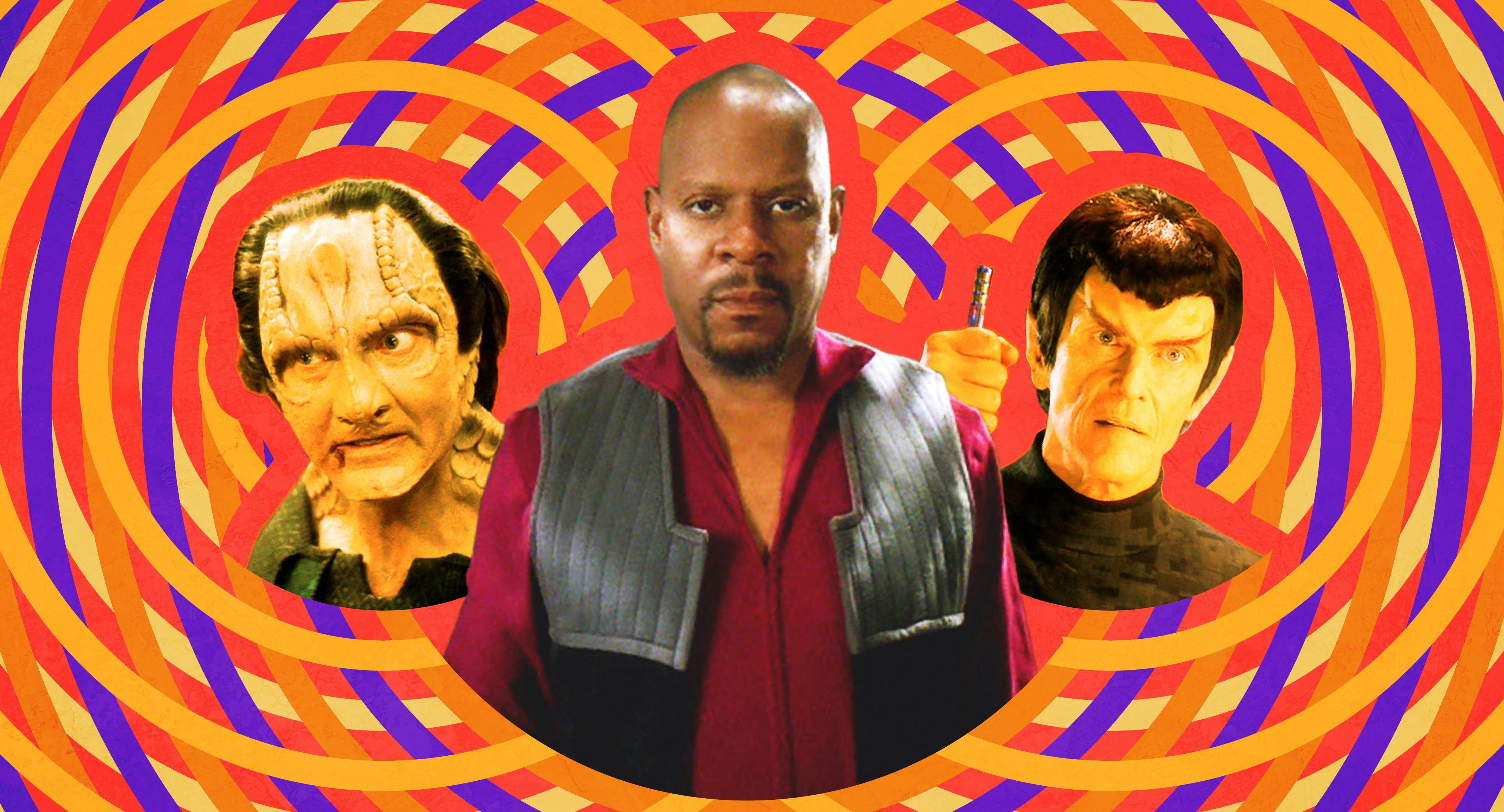
StarTrek.com
“In the Pale Moonlight” holds a history of being one of the most controversial, most celebrated, and most critically acclaimed in all of Star Trek.
Star Trek: Deep Space Nine tested the limits of Gene Rodenberry’s vision by framing it in the climate of war, and “In the Pale Moonlight” is considered one of the darkest results from that evaluation. The writers set out to create an episode where one of our heroes is at the center of a political controversy, and the resulting story was executed brilliantly.
Star Trek History: In the Pale Moonlight
In searching for an answer, we look beyond the script. We will touch on in-universe lore and history, seek insights from what we have been told on the script’s development, and consider words from the show’s creators. Overall, we will try to determine where these elements place our beloved captain along the spectrum of Machiavellianism.
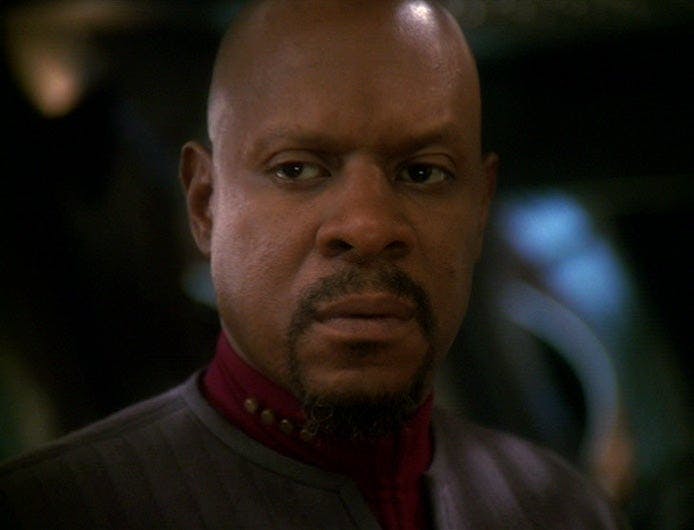
StarTrek.com
Machiavellianism is rarely associated with positive virtue. For instance, ‘psychological Machiavellianism’ is a dark triad trait coupled with narcissism and psychopathy; ‘political Machiavellianism’ is the use of deceit towards self-interest.
In the realm of philosophy, there have been arguments on whether Machiavellianism should have moral weight attached to it. Those who say it should argue that the approach indicates immoral lines of thinking, and its use undermines the essence of democratic choice. Those who say it should not argue that Machiavelli intended to set out a utilitarian methodology, applicable in cases where acting outside of moral boundaries could lead to an outcome — an effectual truth — that avoids the loss which would be suffered if choosing to stay within those moral boundaries.
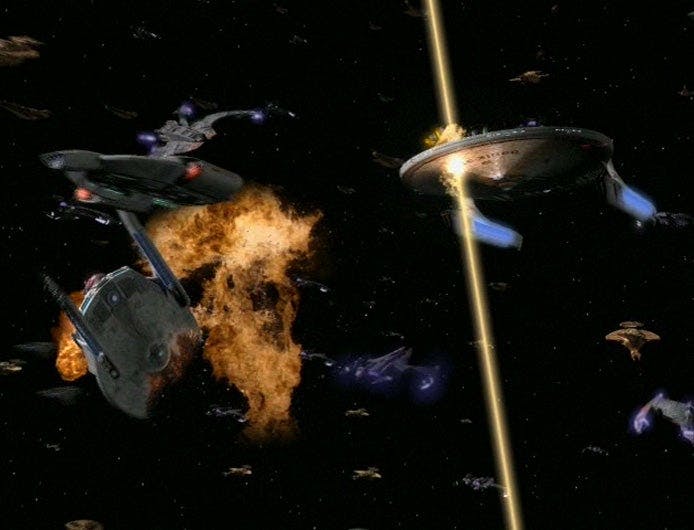
StarTrek.com
What framework can we use to evaluate which form of Machiavellianism would apply? If considering Machiavellianism as a method, it could fit within an emerging definition for the word technology. For instance, economist W. Brian Arthur defines technology as “a means to fulfill a purpose via a device, method, or process.”
As a technology, Kranzberg’s Laws, set out by historian Melvin Kranzberg, also apply. Specifically, the often quoted “technology is neither good nor bad (in and of itself); nor is it neutral (in the context behind its use, and in the consequences that follow).”
Thus, if following this framework, while use of Machiavellian methods would not immediately signify an immoral line of thinking, we still must explore the context and consequence surrounding its use before arriving at any conclusion, being mindful of whether evidence of the negative definitions might be discovered.
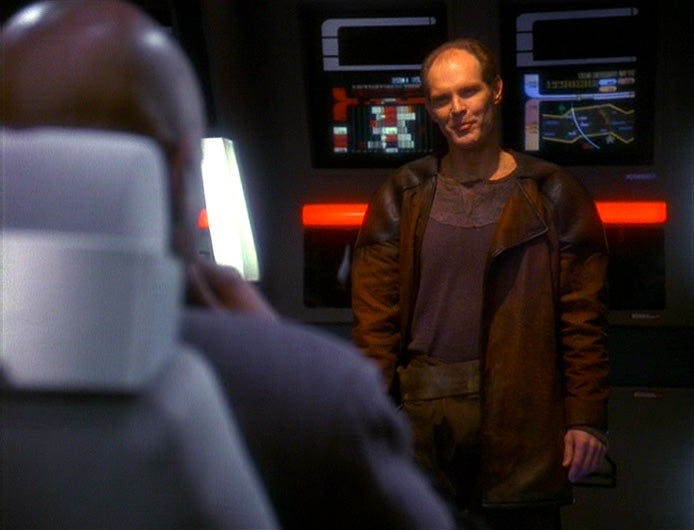
StarTrek.com
Contextually, we need to look at what we know of Sisko as a whole. Sisko has demonstrated the use of Machiavellian methods before, when facing against his former security chief Michael Eddington in "For the Uniform." But two instances alone are not enough to point to psychological Machiavellianism on the part of Sisko. It could be just as apt to say that he has had the misfortune of having to consider Machiavellian methods more than once. Beyond that, the circumstances in that episode merit a separate evaluation of their own.
Politically, by virtue of his command, when the chips are down Sisko’s loyalties are to Starfleet the organization. This is suggested in the working title for this episode, "Patriot." As Michael Taylor notes in the Star Trek: Deep Space Nine Companion, “Sisko makes the kind of decisions that have to be made in war. They’re for the greater good.” Sisko’s motivations are beyond relatively trivial notions of gaining a promotion or more power for himself. Having to distinguish between upholding values and preserving the organization is certainly beyond the scope of self-interest.
With respect to morality, what can we discern from Sisko overall? In his What We Left Behind documentary, series' executive producer and showrunner Ira Steven Behr, reflecting on Avery Brooks’ performance, put it this way, “Avery played Sisko as a man who cared deeply about keeping his people alive in very, very dangerous circumstances.” Consider the beginning of this episode, when Sisko reflects on the weekly casualty lists. Loss of life in war weighs heavily on him; we have seen this in "The Ship," and will see it later in "The Siege of AR-558."
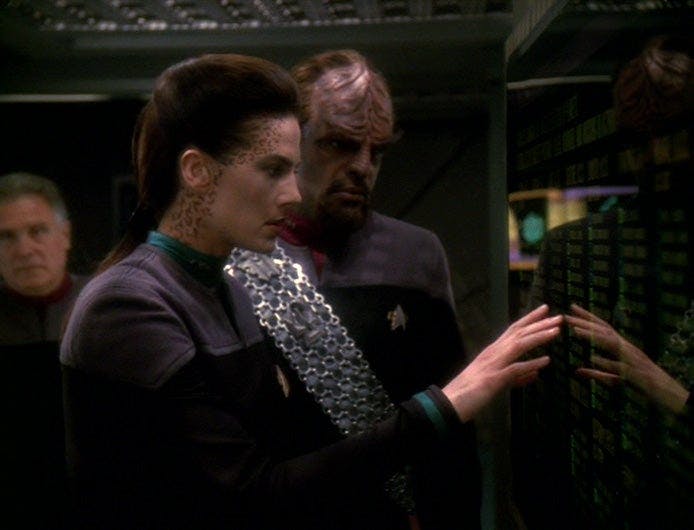
StarTrek.com
Sisko also makes every effort to protect his people’s livelihoods. An omitted scene from "In the Pale Moonlight" takes place during the time that Vreenak was examining the data rod. Dax enters Sisko’s office and proposes that they manufacture evidence of a Dominion plan to attack Romulus. She has no knowledge of the plan already being carried out.
Sisko tries to dissuade her adamantly before saying, “I’ll think about it.” Perhaps with a lighter conscience, Dax says, “I suppose it's one thing to come up with an idea like this... and another to put it into motion.” Sisko replies, “That's why they put these on my collar, old man.”
To Sisko, part of his charge is to protect the integrity of those who serve under him. We saw this in "Rules of Engagement" and "Inquisition." This deleted scene, though not technically canon, demonstrates how Sisko’s charge would apply in this scenario. Overall, it would be hard-pressed to consider motivations of preserving the life and livelihood of others as immoral.
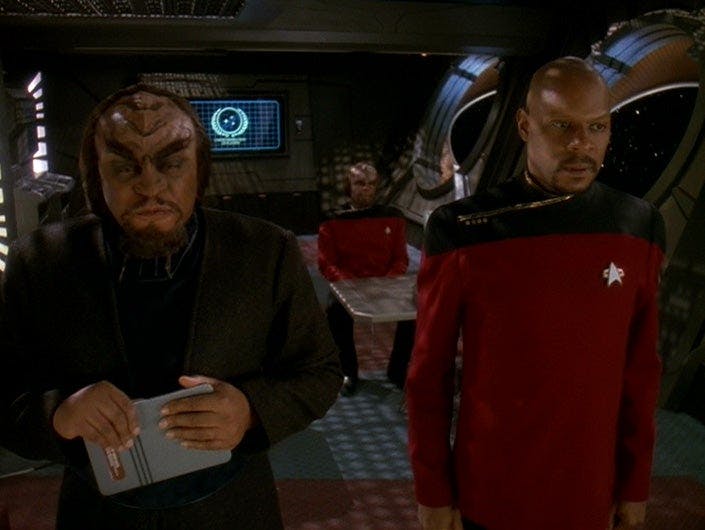
StarTrek.com
Consequentially, the outcome did have a positive effectual truth for the Alliance — the Romulans entered the war — ;but the collateral damage incurred goes beyond the conceptual. There is the ‘substantial truth’ of murders involved. Sisko did not directly authorize Garak’s assassination of Senator Vreenak or the murder of Grathon Tolar, but he does not dispute it when Garak says, “You knew I could do the things you weren't capable of doing yourself.” In being privy to Sisko’s deleted log, he declares his culpability when he says, “I was an accessory to murder.”
We should also consider that Sisko’s gamble involves more than the Dominion; it involves deceiving a group that is not a participant in the war, to have them place millions of their lives fiercely on the line. No matter how strong any projections might have been with respect to the Romulans eventually joining the war, there is now doubt on whether they would have come to that choice on their own.
The unfortunate thing is that although we may have arrived at a means to separate Sisko from most of the negative connotations of Machiavellianism, on the element of consequence, we cannot find a complete moral absolution for the Machiavellian plot as a whole, and by extension, Sisko’s part in it. For a Starfleet officer, this is where Starfleet ideas and notions cannot help but take hold.
Yet at the same time, such is his sacrifice. Notwithstanding the Romulan part of the equation, as a commanding officer, Sisko’s people are Starfleet officers, and by extension, the Alliance. As viewers, for the most part, we identify with that Alliance. We still keep him on the side of good because his efforts are intended to keep us alive, to keep us believing in Federation values towards peaceful coexistence, in spite of himself.
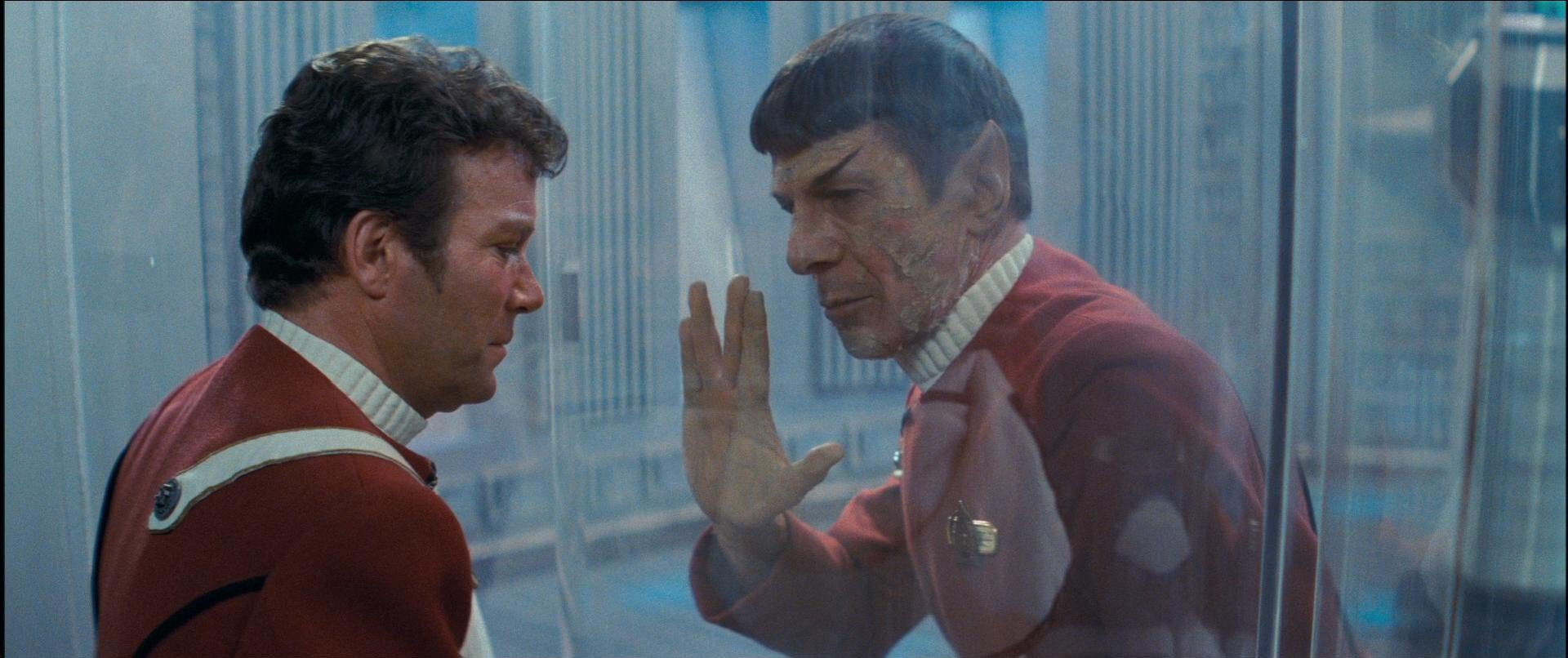
StarTrek.com
A dark thing to consider is that Sisko’s actions might not be considered a complete deviation from the totality of Starfleet values. Looking at the Alpha Quadrant as a whole, "Statistical Probabilities" projected Dominion War casualties at 900 billion. One of Starfleet’s most celebrated figures, Spock said, “The needs of the many outweigh the needs of the few.” In less volatile times, one can afford to ride by Kirk’s reversal, that “the needs of the one outweigh the needs of the many.” But the Dominion War is not one of those times.
At his own expense, and for what it is worth, Sisko admits, “Garak was right about one thing – a guilty conscience is a small price to pay for the safety of the Alpha Quadrant.”
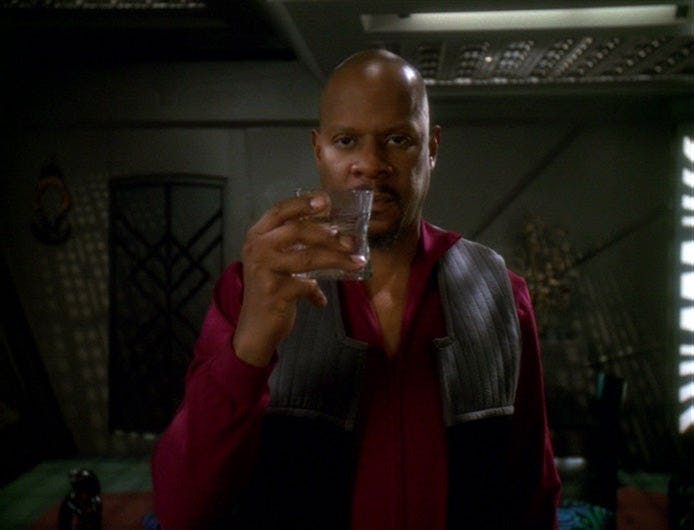
StarTrek.com
Sisko has been regarded as one of the most compelling anti-heroes in fiction. The appeal is not found in his gamble, but in how his storyline measures context and consequence. In the climate of the Dominion War, the scale in which that can be explored is mind-boggling. In this episode, when examining where he might rest between sincere belief and justification, Sisko draws a line between the two and judges himself on the side with a bigger burden to his soul. Though the log is erased, effectual truth will not erase the substantial truth he knows to exist.
"In the Pale Moonlight" leaves it on that note. For all the discussion and reflection that comes after, the episode stands among the best that Star Trek has to offer.
This article was originally published on April 15, 2021.
Jon Encarnacion (he/him) is a freelance writer whose previous work includes interviews with comic book creatives, features on how fiction relates to real-world science, and coverage of events such as the Toronto International Film Festival. The inclusive world of Star Trek has been a constant inspiration in career paths outside of his writing life.
Stay tuned to StarTrek.com for more details! And be sure to follow @StarTrek on Facebook, Twitter, and Instagram.
